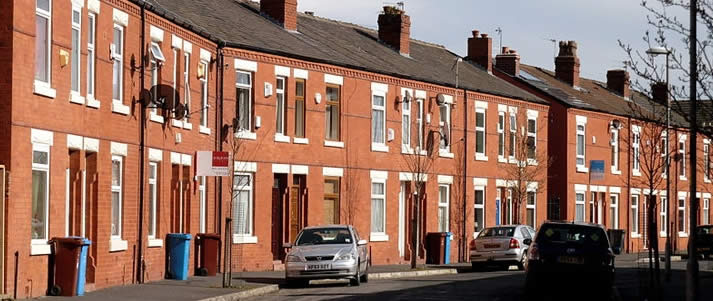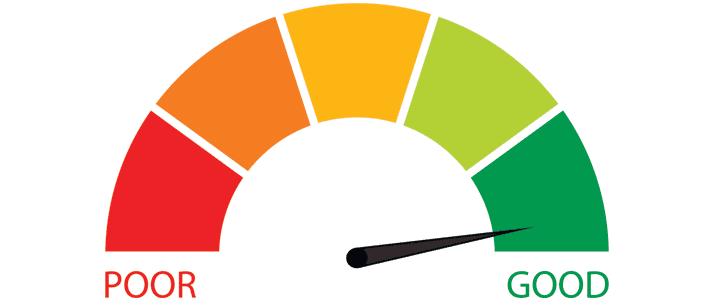Becoming a first-time buyer can seem like a distant pipe dream for far too many of us. But we’re here to show you how you can get on the property ladder while you’re still in your mid-20s.

Credit: I Wei Huang (background), Yeti studio (hand), Witthawas Suknantee (effects) – Shutterstock
When we asked members of our Facebook group at what age they expected to buy their first home, approximately three quarters said that they didn’t anticipate it happening until after they turned 25, with just over 20% believing they wouldn’t own a house until after they turned 30.
Everyone’s circumstances are different, and getting financial help from your parents or other family members will definitely help you buy a house quicker.
But if you know what you’re doing, you can put your feet on the property ladder sooner than you might think – just follow our tips.
How much money do you need to buy a house?

Credit: Manchesterphotos – Wikimedia
The average house price in the UK is £270,708 – however, there are a few important things to consider when you’re looking at this figure.
Firstly, the price of the property itself isn’t the only expense involved when you buy a house. You’ll also need to cover legal costs, mortgage fees, moving your possessions and possibly new furniture too.
Secondly, a little like the cost of university, the price of a house usually isn’t what you pay upfront. Most of the time, the majority of the purchase is covered by a mortgage – a type of loan that you pay back over an extended period of time (usually 20–30 years).
But it’s extremely rare to be offered a mortgage that covers 100% of the cost of a property, so you’ll usually need to pay a percentage of the cost there and then. This money is known as the deposit, which we’ll explain in more detail below, as well as how to save for one.
Finally, the average cost of a house in the UK is just that: an average. Depending on where you are in the country, the average house price could be significantly higher or lower than the national figure. Unsurprisingly, it also tends to cost more to buy a house than it does a flat.
Average house prices across the UK
London is, by quite a margin, the most expensive place to buy a house in the UK. The average price of a property in the capital is £519,934 (almost double the national average), with the average flat/maisonette costing £442,689 and the average terraced house selling for £553,035.
By contrast, the North East of England is the cheapest place to buy a house in the UK. Here, the average property sells for £149,249, with flats/maisonettes costing an average of £96,521 and the average terraced house selling for £118,161.
Elsewhere in the UK, house prices can still vary massively – albeit to a lesser degree. In Northern Ireland*, the average house sells for £159,109, with that figure rising to £182,755 in Scotland and £199,877 in Wales. Clearly, location is extremely important.
* At the top level of the UK House Price Index, prices are only split by region in England. There will still be localised differences in price across Northern Ireland, Scotland and Wales.
How much deposit do you need to buy a house?

Credit: Ubermensch Matt – Shutterstock
Various sources estimate the average deposit used to buy a house in the UK to be about 15% of the value of the property. So, for a house that costs the same as the average property in the UK (£270,708), a 15% deposit would be just over £40,000.
Of course, there’s a lot more to it than that. For starters, just because the average deposit is about 15%, that doesn’t mean you have to save that amount. Mortgages tend to be available for up to 95% of the value of the property, meaning you may only need to save for a 5% deposit.
However, if you have a bigger deposit, you have a better chance of being offered the best first-time buyer mortgages. If you’ve saved enough for a 15% deposit, rather than a 5% deposit, mortgage lenders will likely see you as less of a risk and offer you lower interest rates (not to mention the fact that the monthly repayments should be lower, too).
And, perhaps more importantly, discussing deposits in terms of percentages is pretty unhelpful unless you know where you want to buy a house.
Using the figures we quoted earlier, a 15% deposit on an average property in the North East of England would be about £22,000. But in London, where house prices are significantly higher, £22,000 would only be about 4.3% of the average value of a property – not even enough for a 5% deposit (usually the smallest amount required).
In short, if you’re trying to work out how big a deposit you’ll need to buy a house, you should first work out where you want to live, and then what your chances are of saving a bigger amount to get a better mortgage. Then, set yourself a target of how much you’d like to save and use our tips below to get there.
Is it better to rent or buy?
It’s easy to get sucked into believing that buying a house as soon as possible is the best thing to do – and, for some people, that may be true. But that doesn’t mean it’s the case for everyone.
Both renting and owning a house have their fair share of pros and cons, and it’s worth mulling them over before you mentally commit to stepping onto the property ladder.
Why buying is better than renting
Here’s why buying a house can be better than renting:
- Your monthly mortgage repayments go towards owning your home, rather than paying a landlord.
- You could make a profit if your house increases in value.
- You don’t need to ask for permission to redecorate or have pets.
- You’re not subject to a landlord’s demands, whether that’s increased rent payments, changes to the property or even eviction.
- Similarly, there’s no limit on the amount of time you can spend living in a property.
Why renting is better than buying
This is why renting a house can sometimes be better than buying:
- Moving house is a lot quicker and easier, which is ideal if you’re not in a settled job or relationship.
- If the property needs any repairs or renovations, it’s usually the landlord’s responsibility to organise and pay for them.
- If property prices go down, you won’t lose any money (and, if you’ve saved enough, it could mark a good time to buy your first house).
How to save for a house
Here’s how to become a first-time homebuyer:
-
Open a Lifetime ISA

Short of getting an inheritance or being gifted a sizeable chunk of money from your parents, opening a Lifetime ISA (LISA) is probably the single biggest step you can take to save for a house.
LISAs are a form of savings account (or, more accurately, a type of ISA) that are designed to either be used for retirement or buying a house.
Only a few providers offer Lifetime ISAs, and the interest rates usually aren’t great (the best savings accounts typically have higher), but don’t let these things put you off. What’s important is the fact that for any money you pay into the account (up to £4,000 per year), the government will gift you a 25% bonus on top.
That means that each year, there’s as much as £1,000 of free money on offer, up to a total bonus of £33,000 (equivalent to 33 years of saving £4,000 each year). You’ll probably want to buy a home a little sooner than that, but even five years of saving the maximum amount will get you a bonus of £5,000, taking your savings pot from £20,000 to £25,000.
There are a few things you need to know before opening an account, though, including when you’re allowed to withdraw the money and the maximum value of a property it can be used to buy – so make sure you read our guide to the Lifetime ISA first.
-
Use a Help to Buy scheme
In addition to the Lifetime ISA, there are a handful of other government-funded initiatives that fall under the umbrella of the Help to Buy scheme.
There are loads of options to choose from, including programmes that help key workers, military personnel and those who live in council housing – all of which and more are covered in detail on the government’s official website.
However, there are three in particular that are intended to help first-time buyers, which we’ll briefly summarise now.
First Homes
This is one of the newest schemes announced under Help to Buy so, at the time of writing, only a small number of houses are available through First Homes.
Aimed specifically at first-time buyers, the First Homes scheme allows people to buy selected new-build homes for at least 30% off the market price (although the local council has the power to increase the discount to as much as 50%).
Crucially, if you’re using this scheme, you must already live in the area (as determined by the local council), and priority is given to key workers.
It’s also worth noting that new-build homes often come at a premium, so while a 30% discount is extremely welcome, you may still find an older equivalent house for less.
And if you’re hoping to buy the house at a discount and sell it at full price, think again.
The property must always be bought and sold under the same circumstances that you bought it, meaning the buyer must meet the same eligibility criteria, and you must sell it with the same discount you received. That doesn’t mean you can’t make a profit, though – if the market rate has increased, applying the same percentage discount still means you’re up.
Equity Loan
If you’re struggling to save for a decent-sized deposit, an Equity Loan may be of interest to you.
The scheme is able to loan you up to 20% of the value of the property (40% in London), but you’ll need to have already saved enough for at least a 5% deposit already. So, rather than loaning you an entire deposit, this scheme is intended to help you access mortgages with better rates.
Equity Loans are interest-free for the first five years, which means that if you’re able to pay off that chunk of money in a short enough period of time, it should work out cheaper than borrowing an equivalent amount through your mortgage (and remember, you will still need a mortgage to pay for the remaining percentage of the property).
But over longer periods, it’s very difficult to say whether or not it’s cheaper to get an Equity Loan or a larger mortgage.
What’s more, there are regional caps on the value of a property you can buy, and the scheme is only open in England (and only until March 2023). There is, however, a similar scheme available in Wales.
Shared ownership
As the name suggests, the shared ownership scheme allows you to buy a portion of a house to help you get on the property ladder a little sooner than you otherwise would have been able to.
Through the scheme, you can usually buy a share of between 10% – 75% of a property. And, as you’re not buying 100% of the house, you’ll only need a deposit to cover the portion you are going to own.
In other words, if you’re trying to buy 50% of a £250,000 house (so £125,000), you may only need a 5% or 10% deposit of £6,250 or £12,500 respectively. The rest of the share you buy will need to be covered by a mortgage.
But what about the portion of the property that you don’t buy? Well, that’s where things get complicated. The remaining share of the property will be owned by a housing association, and you’ll need to pay them rent on top of your mortgage repayments.
And there are other pitfalls to shared ownership, too. If you decide you want to buy additional shares in the property, you’ll have to pay whatever the value is at that time – not what it was when you bought your initial chunk.
This means that if the value of the house has increased since you first bought your share, however much more you buy will cost more than it would have done in the past (although, similarly, this does mean that the portion you bought will have increased in value too).
-
Use the skimming trick
Whether you’re still at uni or already working, the skimming trick is one of the best ways to save money every time some cash lands in your bank account.
When your Maintenance Loan, salary or even birthday money is paid, try to skim a set amount off the top of it – say, 10%. If you’re confident you won’t need this money again, shift it into your LISA, earn a bonus on top and take another step towards buying your first home.
However, if you’re worried that you may run out of money before your next injection of cash, it’s probably best to avoid putting your skimmings into your LISA – once it’s in there, you can only withdraw funds for very specific purposes (listed here). Instead, you could just pop the money into an easy-access savings account.
But whatever you do, make sure the money isn’t in your main account. If it’s still in there, you’ll just be tempted to spend it, or possibly even forget that it was meant to be saved in the first place.
-
Make and save as much money as possible

We’ve all seen the graphs that reveal how the gap between the average salary and the average house price has become wider and wider over the past few decades (if not, take a look at this).
As a result, it’s arguably harder than ever to become a first-time buyer and, sadly, there’s a good chance that merely having a full-time job may not be enough to get you on the housing ladder before you turn 25.
Instead, you may need to accelerate the process by making and saving money as much, as often and as creatively as possible.
Some of our favourite ways to make money include:
- Completing paid online surveys
- Getting a pet sitting job
- Generating passive streams of income
- Exploiting all of the ways to make free money.
While some of the best ways to save money include:
- Savings challenges, like the 1p Challenge
- Using cashback sites and supermarket cashback apps
- Getting free food and free coffee whenever you can (after all, paying for takeaway coffees is supposedly why young people can’t afford to buy a house…)
- Maximising the potential of your student discount card.
-
Buy a house with someone else
Fortunate enough to have a significant other, or even a close friend that you’d be happy to buy a house with? Aside from all the perks of not living alone, buying a home with somebody else is, unsurprisingly, a lot cheaper too.
Although it may not be the case, let’s assume for a second that both you and this other person have exactly the same amount of money saved for a deposit. If you were halfway to your savings goal, you’ll suddenly have the full amount!
Alternatively, you may find that pooling your savings gives you even more than you’d originally planned to save. This should allow you to place a deposit on a more expensive house, or get access to a better mortgage on a property around the price you were originally aiming for.
In fact, even if your combined savings aren’t yet enough for a deposit, you’re still closer than you would have been had you gone it alone. And, best of all, you can use two Lifetime ISAs towards a deposit, so that’s double the government bonus too.
It’s worth noting that, as well as saving on a deposit, buying a house with someone else should also mean you’re able to split all of the other costs involved in the process, and hopefully share the burden of what can be a seriously stressful experience.
-
Rent with your partner to save money
Buying a house is a huge financial commitment, and undoubtedly one of the biggest steps you can take with your partner. As such, it’s really important to be sure that you’re comfortable living with them before making arguably the biggest purchase of your life.
The best way to do this is to rent together before deciding to buy. This way, you can work out if your relationship can stand the test of shared living – something you obviously hope it can, but is much better to find out before you’ve invested thousands of pounds and taken out a mortgage together!
Of course, the added bonus of moving in together before buying a house is that, if you’re already living away from your parents, you should be able to save money on rent by sharing a room.
Some landlords may slightly increase your overall rent if someone else moves into the property, but you’ll almost certainly be paying less than you would have been had you lived in the room (or entire property) by yourself.
-
Build a good credit score

Credit: 09910190 – Shutterstock
Your credit score (or ‘credit rating’) is essentially a grade that banks and other lenders use to assess how much money they should give you, and at what rate.
It’s used more often than you might think, too – the types of mobile phone contracts, bank accounts, overdrafts and credit cards that you’re entitled to will all vary depending on the strength of your credit score.
Generally speaking, however, most people are keen to build a good credit score to get the best mortgage – whether that’s more money, better interest rates, or a higher chance of acceptance.
As we explain in our guide to improving your credit score, you don’t have just one score either. Each lender will have their own way of calculating your rating, so it’s important to use several different credit reference agencies to get a good idea of what it might be.
However, while your exact score may differ from lender to lender, the steps you can take to improve it are broadly the same.
Again, our piece on how to improve your credit score has the full details, but here are a few quick tips to bear in mind:
- Make sure you’re on the electoral roll
- Pay your bills on time
- Get a credit card and pay it off in full and on time
- Don’t apply for too many credit products (like phone contracts or credit cards) in too short a time.
-
Improve your spending habits
As well as checking your credit score, mortgage lenders will also assess your spending habits when they’re deciding whether or not to loan you the money.
This is known as an ‘affordability check’, and it basically helps the lender figure out whether or not you’ll actually be able to repay the mortgage you’re asking for.
On a basic level, they’ll look at how much money you have coming in and out of your account each month, as this is the biggest indicator of your ability to make the monthly repayments.
With that in mind, it’s probably best to cut down on your spending a while before you plan to apply for a mortgage, as you want to show that you can comfortably afford to pay them back. Our list of things to stop spending money on is a great place to start.
But it goes deeper than this. Lenders will look at the types of things you spend money on too, with the idea being that certain spending habits can be reliable predictors of your ability to repay your mortgage. For example, regular gambling (especially with large amounts staked) can sometimes be a red flag to lenders, suggesting you may not be able to make repayments.
Similarly, some reports have suggested that using ‘buy now, pay later’ services, like Klarna, can damage your chances of being accepted for a mortgage.
In fact, a senior figure at Experian (one of the UK’s biggest credit agencies) has even warned against using funny or rude payment references when transferring money to or from your friends. That cheap laugh you get from seeing “DRUGS” on your bank statement after paying your friend £5 for a takeaway could end up being very costly indeed!
-
Research locations in more detail
There are loads of factors to consider when deciding where to buy a house, so it’s a good idea to arm yourself with as much knowledge as possible to make sure you’re getting the best value for money. And, in some cases, you may even be able to use your research as extra bargaining power.
Here’s a quick list of things to think about when you’re choosing where to live:
- Look for ‘up and coming’ areas, as (in theory) you could end up making a serious profit on your property if/when you decide to move on in a few years time.
- Check out the official crime stats in the area, especially if you’re looking to raise a family in the near future.
- Similarly, visit the area at night to see what the vibe is like.
- If you’ll be working from home, doing a lot of online gaming or just can’t stand slow internet, use a broadband speed checker to see what the service is like in the area.
- Really think about the location – is it close enough to your friends and family? Is it within a reasonable, commutable distance of your work? And, going forward, is it close enough to other jobs that may interest you in the future? It might be hard to find a place that ticks every box, but don’t go for somewhere that doesn’t tick any!
- Use browser plugins, like this one, to see how the price of a property has changed over time. Estate agents will try their best to convince you that a house is in demand and may go quickly, but if your plugin reveals that it’s been on the market for ages and the asking price has dropped four times, you can play hardball and submit a lower bid.
-
Live with your parents for longer

Credit: Monkey Business Images – Shutterstock
This one may not be an option for everyone, but if it is, it’s certainly worth considering.
In most cases, living with your parents should be cheaper than moving out and renting a place of your own – even if your mum and dad charge you rent, it’s unlikely to be as much as the going rate for private properties.
Imagine you had a choice between living at home for £100 per month, or moving out and paying £500 per month. If you chose to stay with your parents, you’d be saving a massive £4,800 every year – enough to max out your Lifetime ISA and have £800 left over.
However, it’s not all sunshine and roses. Particularly if you were away from home for uni, living with your family again could mean sacrificing a fair bit of freedom and independence. Depending on the relationship you have with your parents, your decision could ultimately come down to what you value most: autonomy or becoming a homeowner.
-
Haggle for extras with a new-build house
Considering a new-build? If you find one that’s perfect in every way, apart from the price, there is a way to keep the dream alive: haggling.
Let’s say you have your heart set on a new-build house that’s a smidge over your budget – be that your absolute top-end, or just the amount you were hoping to spend. The beauty of it being a new-build (in particular one that’s still under construction) is that it’s very easy for the developers to make changes to the property.
So, if you’re looking at the house and thinking, “I’d want to change the floor in the living room, I want a tumble dryer, and USB plug sockets would be useful too”, why not ask the developers to include them all as a condition for paying their asking price?
You may still be paying slightly more than your original budget but, if you get enough extras thrown in, you could end up saving thousands in the medium to long term.
Don’t believe us? Our very own Lauren Nash said that when her parents recently bought a new-build house, they managed to get all kinds of freebies and extras, including a dishwasher, more kitchen cupboards, different flooring, shower screens, turf in the garden, electricity in the garage and more! All that was needed was knowing how to haggle.
Make sure you’re doing everything you can to save money on rent too.
Save the Student




Average Rating